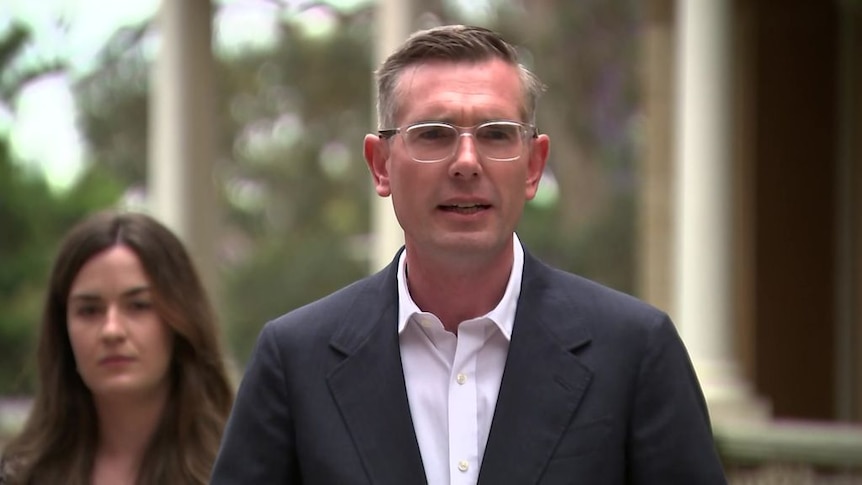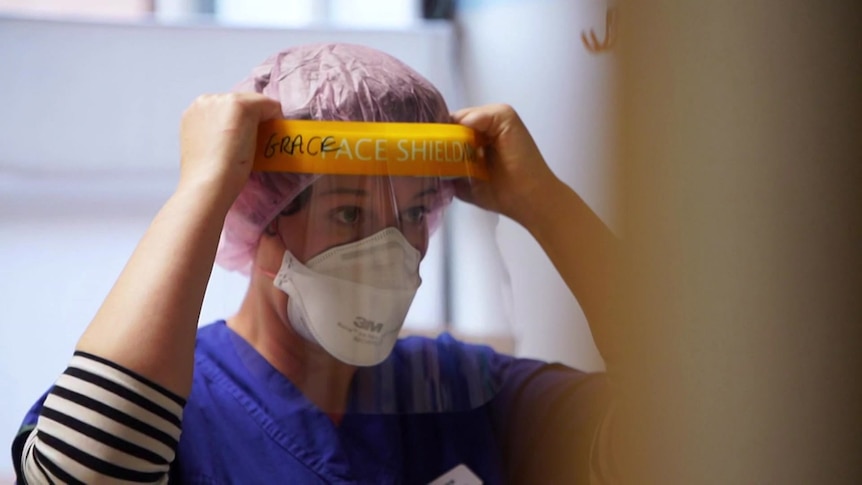NSW student doctors to get paid jobs in hospitals in bid to ease staff shortages
By Isobel Roe

NSW premier announces university-linked medical program to tackle hospital shortages.
Medical students in NSW will be soon be given paid positions in hospitals to bolster the health workforce.
Key points:
Medical students in NSW will be soon be given paid positions in hospitals to bolster the health workforce.
Key points:
Final-year medical students across eight universities will be eligible for the program
The new paid positions are in response to increased staff workload
Both regional and metropolitan hospitals will employ the assistants
The NSW government will create more than 1,000 part-time positions annually for final-year trainees to work alongside doctors as paid "assistants in medicine" in city and regional hospitals.
The program was first trialled in 2020 to combat a staff shortage during the pandemic, and allows final-year students more time in wards and theatres than a usual university placement.
Premier Dominic Perrottet said the program was the first of its kind in the country.
"Our last-year medical students as part of this program are working under supervision with doctors. It actually enhances the health system," Mr Perrottet said.
"Not only are we having more hands on deck, in addition to that we're providing more experience for our future doctors."
Nurses and midwives marched through Sydney's CBD earlier this month, warning of "extreme fatigue" among health workers who were regularly covering extra shifts on understaffed wards.
Mr Perrottet said the problem of skilled worker shortages was not isolated to NSW.
"This is a national issue, it's an international problem, but we'll get through it," he said.
NSW Health Minister Brad Hazzard said the program had proved a "win-win" for students and hospitals.
"These medical students have done an exceptional job supporting our frontline hospital staff in the most critical of times during COVID-19 and, in doing so, gained fantastic experience that will help propel their careers forward as the next generation of NSW doctors," Mr Hazzard said.
Fears of mass exodus of hospital workers

A senior doctor warns Australians will soon no longer be able to assume that if they get sick there'll be an ambulance, hospital bed or doctor to take care of them.
The new paid positions are in response to increased staff workload
Both regional and metropolitan hospitals will employ the assistants
The NSW government will create more than 1,000 part-time positions annually for final-year trainees to work alongside doctors as paid "assistants in medicine" in city and regional hospitals.
The program was first trialled in 2020 to combat a staff shortage during the pandemic, and allows final-year students more time in wards and theatres than a usual university placement.
Premier Dominic Perrottet said the program was the first of its kind in the country.
"Our last-year medical students as part of this program are working under supervision with doctors. It actually enhances the health system," Mr Perrottet said.
"Not only are we having more hands on deck, in addition to that we're providing more experience for our future doctors."
Nurses and midwives marched through Sydney's CBD earlier this month, warning of "extreme fatigue" among health workers who were regularly covering extra shifts on understaffed wards.
Mr Perrottet said the problem of skilled worker shortages was not isolated to NSW.
"This is a national issue, it's an international problem, but we'll get through it," he said.
NSW Health Minister Brad Hazzard said the program had proved a "win-win" for students and hospitals.
"These medical students have done an exceptional job supporting our frontline hospital staff in the most critical of times during COVID-19 and, in doing so, gained fantastic experience that will help propel their careers forward as the next generation of NSW doctors," Mr Hazzard said.
Fears of mass exodus of hospital workers
A senior doctor warns Australians will soon no longer be able to assume that if they get sick there'll be an ambulance, hospital bed or doctor to take care of them.
An evaluation of the trial found supervisors saw rapid skill progression among the students, and it freed up more qualified junior doctors to focus on clinical tasks and patient care, and attend theatre more frequently.
Medical student Tessa Eves, who works in palliative care at Sydney's Royal Prince Alfred Hospital as part of the trial, said it was an invaluable way to learn practical skills while studying.
"Sometimes it'll be you and the intern if the more senior staff are busy. Other times you will have the whole team there," Ms Eves said.
"Things crop up during the day and this is where being a [medical assistant] is really helpful, because if they've only got one junior doctor and you've got 10 jobs to do, that's a lot of pressure."
NSW Labor leader Chris Minns said he did not mind the idea, but more should be done to fix staff shortages in the public health system.
"I don't think it should take away from the extreme pressure that western Sydney emergency departments are going through," Mr Minns said.
The assistants in medicine are final-year medical students from the Australian National University, University of Sydney, the University of Notre Dame, Macquarie University, Western Sydney University, University of New South Wales, University of Newcastle/University of New England and University of Wollongong.
Medical student Tessa Eves, who works in palliative care at Sydney's Royal Prince Alfred Hospital as part of the trial, said it was an invaluable way to learn practical skills while studying.
"Sometimes it'll be you and the intern if the more senior staff are busy. Other times you will have the whole team there," Ms Eves said.
"Things crop up during the day and this is where being a [medical assistant] is really helpful, because if they've only got one junior doctor and you've got 10 jobs to do, that's a lot of pressure."
NSW Labor leader Chris Minns said he did not mind the idea, but more should be done to fix staff shortages in the public health system.
"I don't think it should take away from the extreme pressure that western Sydney emergency departments are going through," Mr Minns said.
The assistants in medicine are final-year medical students from the Australian National University, University of Sydney, the University of Notre Dame, Macquarie University, Western Sydney University, University of New South Wales, University of Newcastle/University of New England and University of Wollongong.
No comments:
Post a Comment